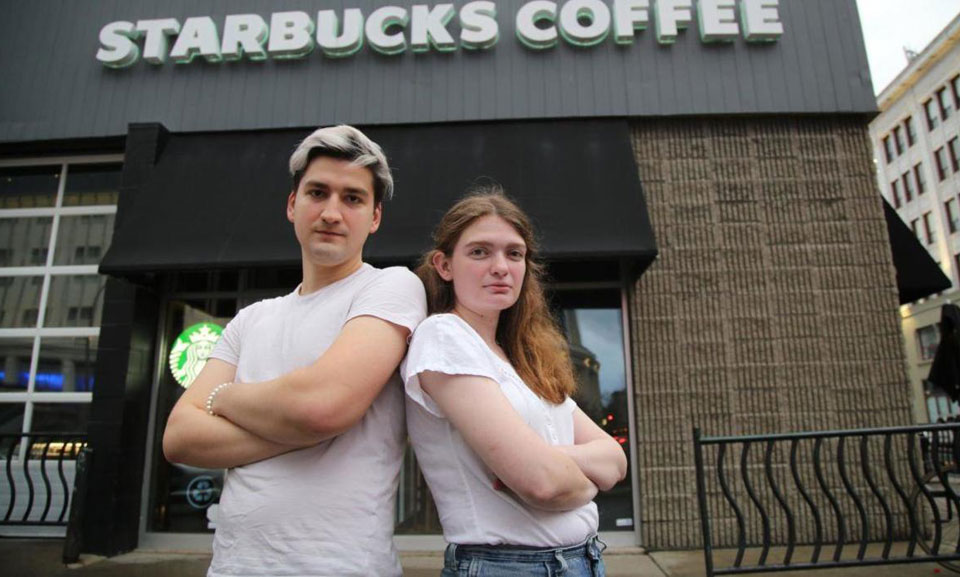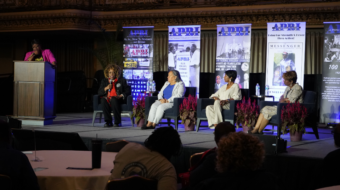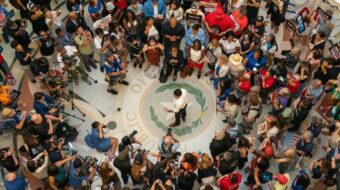
WASHINGTON—The ravages of the coronavirus pandemic and the dependence of all of us on “essential” workers such as grocery stockers, nurses, home health care workers and truckers woke the entire nation—including them—to their value, AFL-CIO President Liz Shuler says.
And it accelerated the awareness and activism among those workers, especially younger workers, of their power, their value and their chances and ability to fight back against corporate exploitation, she adds. The country won’t revert to its past “normal” doze which ignored workers, either, Shuler predicts.
Why? Workers have weapons: Direct action, the so-called Great Resignation to take better jobs, and especially forming and joining unions, Shuler states. A notable organizer agrees.
“People see a union as the only way to change a workplace from a dictatorship to a democracy,” said Starbucks Workers United organizer Jaz Brisack. Starting in Buffalo, N.Y., Brisack and her colleagues have aided rank-and-file workers at 200 Starbucks stores, and counting, despite bosses’ hate.
And in turn, the labor movement is changing and taking a new direction to help Brisack and her colleagues organize those new and younger workers, Shuler declares.
Shuler, federation president for just over a year, made those points in a q-and-a the Washington Post hosted. It was the second of three parts of its “The Future Of Work” series.
Ai-Jen Poo, co-founder and Executive Director of the National Domestic Workers Alliance joined Shuler. NDWA said its cohort of workers have their own leverage: Other workers, especially in two-parent households or among the rapidly growing numbers of elderly, depend on home care workers to make their own lives possible and fulfilling. Brisack spoke separately afterwards.
Shuler spoke the day after the AFL-CIO welcomed its 58th member union, the small but strong Major League Baseball Players Association, into the federation—and after MLBPA Executive Director Tony Clark reported it received union authorization cards from more than 90% of one of the most-exploited worker groups in the U.S.: The nation’s 5,800 minor league ballplayers. That drive took one week.
It’s exploited groups like the Starbucks baristas and baseball’s minor leaguers who are the new and youthful energy behind the rising tide of organizing, Shuler explained.
“For too long, workers have been made to feel powerless, that they should accept the wage they get” from the boss and toil in “unsafe work environments, not having health insurance or making enough to make ends meet” unless they toil at two or three jobs, she said.
No more. The pandemic led them finally “rising up” to demand better wages, benefits, justice and respect on the job, said Shuler. They also noticed that while they made little, CEO pay skyrocketed to more than 300 times a median worker’s earnings.
“And they found they can make changes in the workplace by banding together—and that’s what a union is.”
The militancy and activism of the newly organizing workers has spread to a wide range of occupations and firms, even those which were and are staunchly resistant to workers’ unionizing, she said. Notable recent examples include the retailer REI, Starbucks and Amazon.
That’s despite absolute hate for unions and workers from bosses such as Amazon majority owner Jeff Bezos—one of the nation’s three richest people–and Howard Schultz, who just quit as Starbucks CEO after rampant labor law-breaking during the workers’ organizing.
That’s also despite obstacles in U.S. labor law, both Ai-Jen Poo and Shuler noted. History shows many of those obstacles, including exclusion of domestic workers, who are overwhelmingly women of color, are due to endemic racism, sexism or both.
So as a result, the two leaders said, labor law is massively tilted against workers. So are bosses, with few exceptions. “Corporations see unions as a threat and they’ll do anything to harass, intimidate, threaten and fire workers” to stop organizing drives, Shuler commented.
Labor law has few and weak remedies for such union-busting. Firms spend an estimate $300 million-plus on it yearly. The Protect The Right To Organize (PRO) Act, labor’s #1 legislative priority, would help level the playing field despite such bullying. The Democratic-run House passed the PRO Act in this Congress and in its predecessor in 2019-20.
Senate Republicans, who hate workers and unions and who kowtow to extreme right-wingers, corporate moguls, or both groups, have stopped the PRO Act with filibuster threats or—in the prior Congress—refusing to even hold hearings on it.
It’s such corporate-fueled obstruction that has led the AFL-CIO, the NDWA and other unionists and activists out onto the hustings in what the fed predicts will be record numbers of voting organizers for this year’s election, Shuler said.
“I could not be more fired up for the midterms” Shuler said of the approaching voting. “People are continuing to struggle to make ends meet by working one, two or three jobs each because we” as a society “haven’t produced living wages” for millions, she explained.
Electing pro-worker lawmakers who can raise the minimum wage to at least $15 an hour—it’s been $7.25 since the start of 2009—and enact the PRO Act becomes a key to improving their lives, Shuler elaborated.
NDWA, faced with several extra obstacles from corporations and courts for its workers’ sector, isn’t waiting for that congressional vote or November, “even though it’ll be critically important to elect candidates who put working people first,” Ai-Jen Poo conceded.
Meantime, NDWA is crafting work-arounds to avoid the obstacles corporations and the courts have thrown in workers’ way “We have to be creative and also show how workers have unique value to shape workplaces” for the better, she said.
Nevertheless, “The future of our democracy is at stake. We need working people at the bargaining table and to vote now more than even before. Unions and working people are the first line of defense” of democracy “and always have been.”










